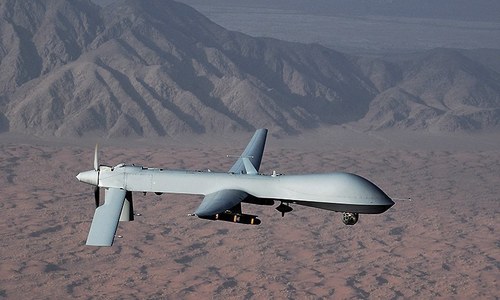United States Secretary of State Mike Pompeo held talks on Monday with Saudi leaders ahead of new sanctions on Tehran in a standoff sparked by Washington's withdrawal from a nuclear deal.
Both the US and Iran say they want to avoid going to war, but tensions have spiked after Tehran shot down an American drone and a series of attacks on tankers in sensitive Gulf waters raised fears of an unintended slide towards conflict.
Saudi and Emirati leaders advocate a tough US approach against common foe Iran, which on Monday said that any new American sanctions against it would have no “impact”.
Pompeo met Saudi King Salman and Crown Prince Mohammed bin Salman in the Red Sea city of Jeddah days after the downing of the surveillance drone prompted US President Donald Trump to order a military strike before calling it off at the last minute.
He was later due to hold talks in the United Arab Emirates, US officials said.
Pompeo described Saudi Arabia and the UAE as “two great allies in the challenge that Iran presents”.
“We'll be talking with them about how to make sure that we are all strategically aligned and how we can build out a global coalition,” Pompeo said.
He said the US sought a coalition “not only throughout the Gulf states but in Asia and in Europe that understands this challenge and that is prepared to push back against the world's largest state sponsor of terror”.
Tehran says the drone violated Iranian airspace and Foreign Minister Mohammad Javad Zarif has backed the claim with maps and coordinates -- allegations dismissed by Washington.
Cyber attack
US media reports said Trump ordered a retaliatory cyber attack against Iranian missile control systems and a spy network after the drone was shot down.
But on Monday Iranian Telecommunications Minister Mohammad Javad Azari Jahromi said no cyber attack against his country had ever succeeded.
“The media are asking about the veracity of the alleged cyber attack against Iran. No successful attack has been carried out by them, although they are making a lot of effort,” he said on Twitter.
He acknowledged that Iran has “been facing cyber terrorism — such as Stuxnet — and unilateralism — such as sanctions”, naming a virus believed to have been engineered by Israel and the US to damage nuclear facilities in Iran.
Trump has said he was ready to reach out to Iran if the country agreed to renounce nuclear weapons.
Iran has denied seeking a nuclear weapon, and says its programme is for civilian purposes.
With the US out of the deal, Iran has said it would reduce some of its nuclear commitments unless the remaining partners — Britain, China, France, Germany and Russia — help it circumvent US sanctions and sell its oil.
The landmark 2015 accord sought to curb Iran's nuclear ambitions in exchange for sanctions relief.
US to tighten sanctions
Trump left that agreement more than a year ago and has imposed a robust slate of punitive sanctions designed to choke off Iranian oil sales and cripple its economy — which he now plans to expand.
“We are putting major additional Sanctions on Iran on Monday,” tweeted Trump, who has also deployed additional troops to the Middle East.
“I look forward to the day that Sanctions come off Iran, and they become a productive and prosperous nation again - The sooner the better!”
But in a show of defiance, Iran's foreign ministry said Monday the new sanctions would have no “impact”.
“We really do not know what (the new sanctions) are and what they want to target anymore, and also do not consider them to have any impact,” ministry spokesman Abbas Mousavi said at a press conference in Tehran.
Thierry Coville, an Iran expert at the French Institute of International Relations, also questioned whether there was room for further US action as previous sanctions have already severely hit Iranian crude exports.
“The Americans are asphyxiating Iran economically in order to force them to hold talks with them,” Coville said. “What more can be done? They will no doubt tighten secondary sanctions... and most probably extend a list of Iranian firms banned from trade.”
The downing of the US drone came after a series of attacks on tankers in the congested shipping lanes of the Gulf, which Washington has blamed on Tehran.
Meanwhile, the Riyadh-led military coalition in Yemen said Houthi rebels attacked a civilian airport in southern Saudi Arabia on Sunday, killing one civilian and wounding 21 others.
Riyadh has repeatedly accused Iran of supplying sophisticated weapons to the Houthis, who have launched cross-border attacks on facilities inside Saudi Arabia.
Iran has denied attacking tankers or supplying the Houthis.
















































